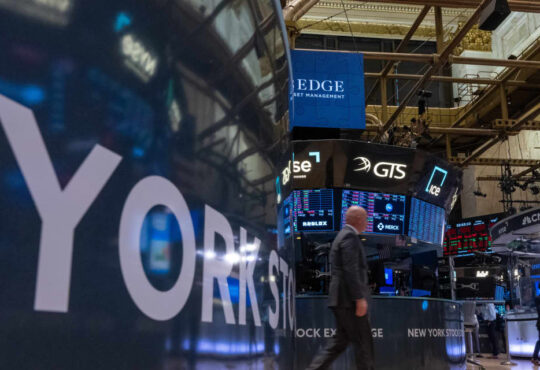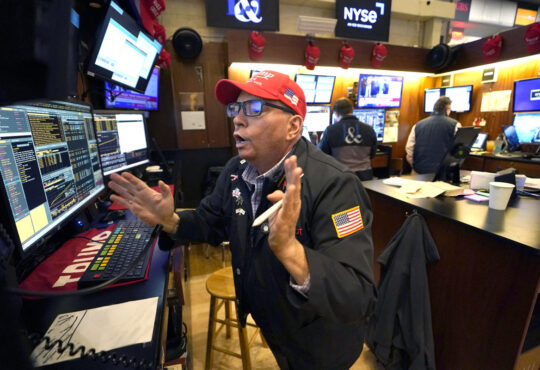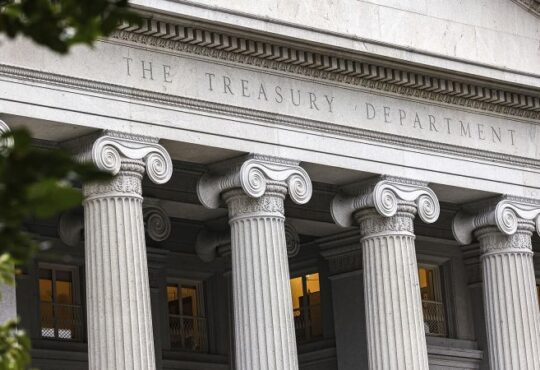
Fed decision ahead, data and stocks
European stocks close slightly higher
European stocks closed slightly higher on Wednesday, as investors awaited the latest monetary policy decision from the U.S. Federal Reserve.
The pan-European Stoxx 600 provisionally ended up 0.16%, with major bourses in the green and sectors in mixed territory.
The U.K.’s FTSE 100 closed down 0.01%, Germany’s DAX ended 0.07% higher, France’s CAC 40 up 0.35% and Italy’s FTSE MIB 0.31% higher.
— Karen Gilchrist
Stocks on the move: Canal+ up 8%; Nestle down 1.8%
Shares of French broadcaster Canal+ rose 8%, reversing two straight days of losses after spinning off from media holding company Vivendi and debuting Monday on the London Stock Exchange.
Meanwhile, Swiss food maker Nestle fell 1.8% shortly after announcing it was launching a new range of protein shots in the U.S. which help to suppress appetite.
— Karen Gilchrist
U.S. stocks open mixed
U.S. stocks opened mixed on Wednesday as investors awaited the Federal Reserve’s December interest rate decision.
The Dow Jones Industrial Average was up 0.17% in early deals after recording its longest losing streak since 1978 on Tuesday.
The S&P 500 and Nasdaq Composite, meanwhile, were both down around 0.1%.
— Karen Gilchrist
London rents rise at record pace
A row of brick terrace houses in London’s Clapham district
Alex Robinson Photography | Moment | Getty Images
The cost of privately renting a property in London jumped 11.6% in the year to November, the U.K.’s Office for National Statistics said Wednesday.
It means housing rents in the U.K. capital are rising at the fastest pace on record, the ONS said, with the average monthly rent in the city costing £2,206 ($2,805) in November.
Meanwhile, average private rents across the entire U.K. rose by 9.1% in the 12 months to November.
More broadly, prices are rising across the U.K., with wage costs and Britain’s Consumer Price Index also jumping on an annual basis.
The country’s economy, meanwhile, unexpectedly contracted in last week’s October gross domestic product (GDP) print.
— Chloe Taylor
UK borrowing costs reach fresh 34-year high over Germany
The gap between U.K. borrowing costs over Germany’s notched a fresh 34-year high on Wednesday, as investors assessed the path of interest rates for the Bank of England and European Central Bank next year.
The 10-year gilt yield was 4 basis points higher at 4.563% at 12:42 p.m. in London, just off an earlier peak, while the 10-year bund yield — the benchmark for the euro area — remained a little under 2 basis points higher at 2.256%, taking the spread to 230.7 basis points.
The spread between the two had already closed at 230 basis points on Tuesday, hitting its widest level since 1990, according to Deutsche Bank. Notably, the spread was wider than the level seen during the U.K’s so-called “mini-budget crisis” of 2022, when yields spiked following a sweeping fiscal announcement.
“The view from a market perspective is that U.K. inflation is at risk of proving stickier than in the U.S. and the euro area, so the BoE likely won’t be able to cut as aggressively as the [U.S.] Fed or ECB, with investors now only expecting 53 basis points of cuts by the time of the November 2025 meeting,” Deutsche Bank strategists led by Jim Reid said in a Wednesday note.
Though the level of the U.K. headline inflation is not dissimilar from the rates observed in the euro area and in the U.S., policymakers at the BOE appear more concerned with rates of domestically-driven consumer price increases, along with wage growth.
Britain’s risk premium also climbed after the country’s new Labour government’s budget on Oct. 31 announced a major program of tax hikes targeted primarily at businesses. Several economists stressed at the time that the moves were not comparable to the mini-budget, which triggered huge market volatility driven by factors in liability-driven investments.
Birkenstock earnings beat expectations
Birkenstock shoes are displayed at a Birkenstock store on February 29, 2024 in Larkspur, California.
Justin Sullivan | Getty Images
German footwear manufacturer Birkenstock reported an unexpected jump in revenue on Wednesday, when it published earnings for its fiscal year ending in September.
The company’s annual revenue came in at 1.8 billion euros ($1.89 billion), beating market expectations at 1.78 billion euros, according to LSEG data. It marked 22% year-on-year revenue growth on a constant currency basis, beating Birkenstock’s earlier guidance that said revenue would jump 20% from 2023.
Adjusted net profit rose 16% year-over-year to reach 240 million euros, while adjusted earnings per share were up 13% from a year earlier.
The which debuted on the New York stock market last year.
— Chloe Taylor
Expect volatile markets in 2025, economist warns
Sylvain Broyer, chief EMEA economist at S&P Global Ratings, said in a note to clients on Wednesday that investors should brace themselves for a difficult trading environment next year.
“Between the possible correction of the economic anomalies that emerged in 2024 and the potential for policy pivots in 2025, we expect European economies and markets will be subject to high volatility over the coming 12 months,” noted Broyer, a member of the European Central Bank’s “shadow council” of economists.
The incoming U.S. administration of Donald Trump, changes in EU leadership and forthcoming German elections are all clouding the economic outlook for Europe, he added.
— Chloe Taylor
Don’t expect a Bank of England rate cut until February: Morgan Stanley
Investors shouldn’t expect interest rates in Britain to go down until 2025, Bruna Skarica, chief U.K. economist at Morgan Stanley, said in a note to clients on Wednesday.
The Bank of England previously hinted that four rate cuts could be on the cards in 2025 — but weak economic data over the past week has dampened hopes that a such a trim is imminent.
Markets are overwhelmingly expecting the Bank of England to hold rates steady at its upcoming Monetary Policy Committee meeting on Thursday, overnight index swap data shows. The data also indicate that traders are divided on whether the central bank will keep its key interest rate at 4.75% or reduce it when the MPC convenes again in February. A small majority is leaning toward a hold.
Skarica said in the Wednesday note that she is positioned away from that consensus, stressing, “We expect the next cut in February.”
— Chloe Taylor
Sweden’s SBB up 23%
Shares of Swedish property group SBB surged during Wednesday’s trading session, gaining 23% by 9:50 a.m. London time.
The stock rally came after SBB announced it had completed a bond exchange that saw creditors agree to swap 2.8 billion euros’ ($2.94 billion) worth of debt for new notes.
SBB CEO Leiv Synnes told news agency Reuters on Wednesday that the exchange — which was accepted by 95% of relevant creditors — would allow the firm to press ahead with its restructuring plans.
— Chloe Taylor
France has not respected fiscal rules for decades, economist says
Financial markets have allowed countries like France to get away with disrespecting the euro zone’s fiscal rules for too long, economist Raphael Gallardo told CNBC Wednesday.
France is among a number of euro zone member states that have failed to meet the single currency union’s fiscal rules that require member states to keep budget deficits below 3% of GDP (gross domestic product) and to restrict public debts below 60%.
The French government expects the budget deficit to hit 6.1% of GDP this year, however, while the International Monetary Fund predicts the country’s debt to GDP ratio will reach around 112%. Arguments between lawmakers over taxation and spending plans means France currently has no 2025 budget in place and has instead rolled over this year’s fiscal plan, as political turbulence continues.
Gallardo, chief economist at Carmignac, said France had not respected the rules for years.
“Unfortunately, the problem in the euro area is that you cannot have a currency union with it without fiscal discipline and a mechanism to enforce that fiscal discipline, and in the case of France, for 25 years, we have never respected the rules,” he told CNBC’s “Squawk Box Europe” Wednesday.
“The safeguards in the European constitution have been completely unable to enforce it on the French government and the markets haven’t done their job either, because they have considered that France — being a core country — will be bailed out,” he said.
— Holly Ellyatt
Unicredit shares rise
The headquarters of UniCredit SpA bank in Milan, Italy, on Friday, Nov. 29, 2024.
Francesca Volpi | Bloomberg | Getty Images
Shares of Italian lender Unicredit gained 0.5% by 8:45 a.m. London time, after the bank said it had raised its potential stake in Commerzbank to 28%.
Unicredit had previously held a 21% stake in the German lender.
Read the full story here.
— Chloe Taylor
Renault shares jump 5%
The electric Renault 5 at Automotive Summit at the Porte de Versailles exhibition center, Paris, France, on October 15, 2024.
Stephane Mouchmouche | Hans Lucas | Afp | Getty Images
Shares of French carmaker Renault rose 5.39% by 8:21 a.m. London time, following reports that Nissan and Honda are set to enter into merger talks.
Renault owns a minority stake in Nissan, whose Tokyo-listed shares gained 24% during the trading session in Asia — their best day in four decades.
— Chloe Taylor
UK inflation rises to 2.6%
The Bank of England (BOE) in the City of London, UK, on Monday, Dec. 16, 2024.
Jason Alden | Bloomberg | Getty Images
Inflation in the U.K. rose to 2.6% in the year to November, meeting expectations but further dampening hopes of a rate cut from the Bank of England on Thursday.
The U.K.’s annual inflation rate stood at 2.3% in October.
Yields on the U.K.’s 10-year Gilt were little changed by 7:05 a.m. at 4.519%, while the British pound was down 0.07% against the U.S. dollar to trade at around $1.2700.
Markets are now overwhelmingly expecting the Bank of England to hold its key interest rate at 4.75% when its Monetary Policy Committee meets for the final time this year, according to overnight index swap data.
Read the full story here.
— Chloe Taylor
Sterling dips ahead of UK inflation data
Karol Serewis | Lightrocket | Getty Images
The British pound traded lower against the dollar and the euro on Wednesday morning, as investors awaited the U.K.’s latest inflation print and a policy update from the Bank of England.
Sterling was around 0.1% lower against the euro, and 0.06% weaker against the greenback by 6:35 a.m. London time.
November inflation data, which will be published Wednesday morning, comes after official figures showed wage growth in Britain jumped 5.2% in the three months to October, while the nation’s economy unexpectedly contracted that month.
On Thursday, the Bank of England will make its final monetary policy decision of the year.
— Chloe Taylor
CNBC Pro: These 6 stocks rose as Nvidia fell into correction territory
Six stocks in the S&P 500 have been inversely correlated to Nvidia’s share price moves over the past month, according to analysis by CNBC Pro.
Five of the six stocks have also risen by an average of 6.75% alongside Nvidia’s fall from all-time highs.
It comes as Nvidia fell into correction territory this week, meaning it’s fallen over 10% from its closing high of $148.88 reached last month.
CNBC Pro subscribers can read more here.
— Ganesh Rao
European markets: Here are the opening calls
European markets are expected to open lower Wednesday.
The U.K.’s FTSE 100 index is expected to open 8 points lower at 8,191, Germany’s DAX down 48 points at 20,202, France’s CAC down 10 points at 7,353 and Italy’s FTSE MIB down 100 points at 34,258, according to data from IG.
Data releases will include U.K. inflation data.
— Holly Ellyatt




